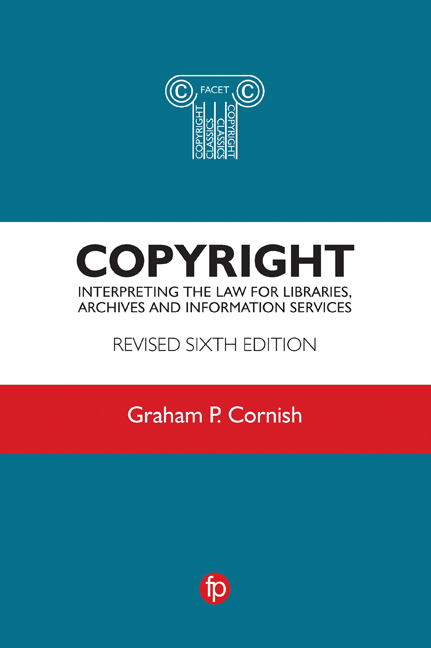Book contents
- Frontmatter
- Contents
- Author's note
- Acknowledgements
- List of abbreviations
- Introduction
- Section 1 Definition and law
- Section 2 What is covered by copyright?
- Section 3 Rights and limitations
- Section 4 Literary, dramatic and musical works
- Section 5 Artistic works
- Section 6 Sound recordings and performers’ rights
- Section 7 Films and videos
- Section 8 Broadcasts
- Section 9 Databases
- Section 10 Licensing schemes and licences
- Section 11 Computer programs, the electronic world and websites
- Section 12 Other matters
- Useful Addresses and Contacts
- Useful Sources of Information
- Appendix: suggested declaration forms
- Index
Section 3 - Rights and limitations
Published online by Cambridge University Press: 19 November 2019
- Frontmatter
- Contents
- Author's note
- Acknowledgements
- List of abbreviations
- Introduction
- Section 1 Definition and law
- Section 2 What is covered by copyright?
- Section 3 Rights and limitations
- Section 4 Literary, dramatic and musical works
- Section 5 Artistic works
- Section 6 Sound recordings and performers’ rights
- Section 7 Films and videos
- Section 8 Broadcasts
- Section 9 Databases
- Section 10 Licensing schemes and licences
- Section 11 Computer programs, the electronic world and websites
- Section 12 Other matters
- Useful Addresses and Contacts
- Useful Sources of Information
- Appendix: suggested declaration forms
- Index
Summary
This section looks at what rights authors and owners of copyright enjoy under the law.
What is the difference between authorship and ownership?
Authors and owners may, or may not, be the same person. They enjoy different rights, so the distinction is important. As authors are defined differently for different types of work, they will be dealt with separately under each heading. However, despite some variations, their moral rights are similar in most circumstances so they will be covered in this section. This section then sets out who the owner is and what the owner is entitled to do exclusively in law. The rights enjoyed by authors are called ‘moral rights’ and are generally very weak in UK law. On the other hand, owners enjoy a whole range of rights which are economic in nature. The limitations to these rights are then dealt with in Section 4.
Moral rights
What are moral rights?
Moral rights are designed to protect the idea that anything created contains an element of ‘self’ in it. Therefore the author ought to be able to protect certain aspects of a work. Although the law is complex in this area and most library services may not think they have major concerns with moral rights, the growth of electronic information sources, Open Archives, Creative Commons and similar systems makes an understanding of moral rights important for all information services.
What are these rights?
Essentially they give the author the right to protect their work from being abused or their reputation from being sullied.
What specific rights do authors have?
Basically, authors have a right to prevent their work being distorted by additions, deletions or changes to its meaning. They also have the right not to have works they did not create attributed to them and prevent anyone else claiming to be the author of their work. They also have the right to prevent their work being used in a way that would bring their reputation into disrepute.
What about making sure their name is included in a work?
Rather surprisingly, this is not an automatic right of the author. It applies in certain contexts only and will be dealt with under each type of copyright material in the following sections. In summary, it applies only to authors of monographs, producers and directors of films and artists whose work is to be exhibited in public.
- Type
- Chapter
- Information
- CopyrightInterpreting the law for libraries, archives and information services, pp. 13 - 22Publisher: FacetPrint publication year: 2019



